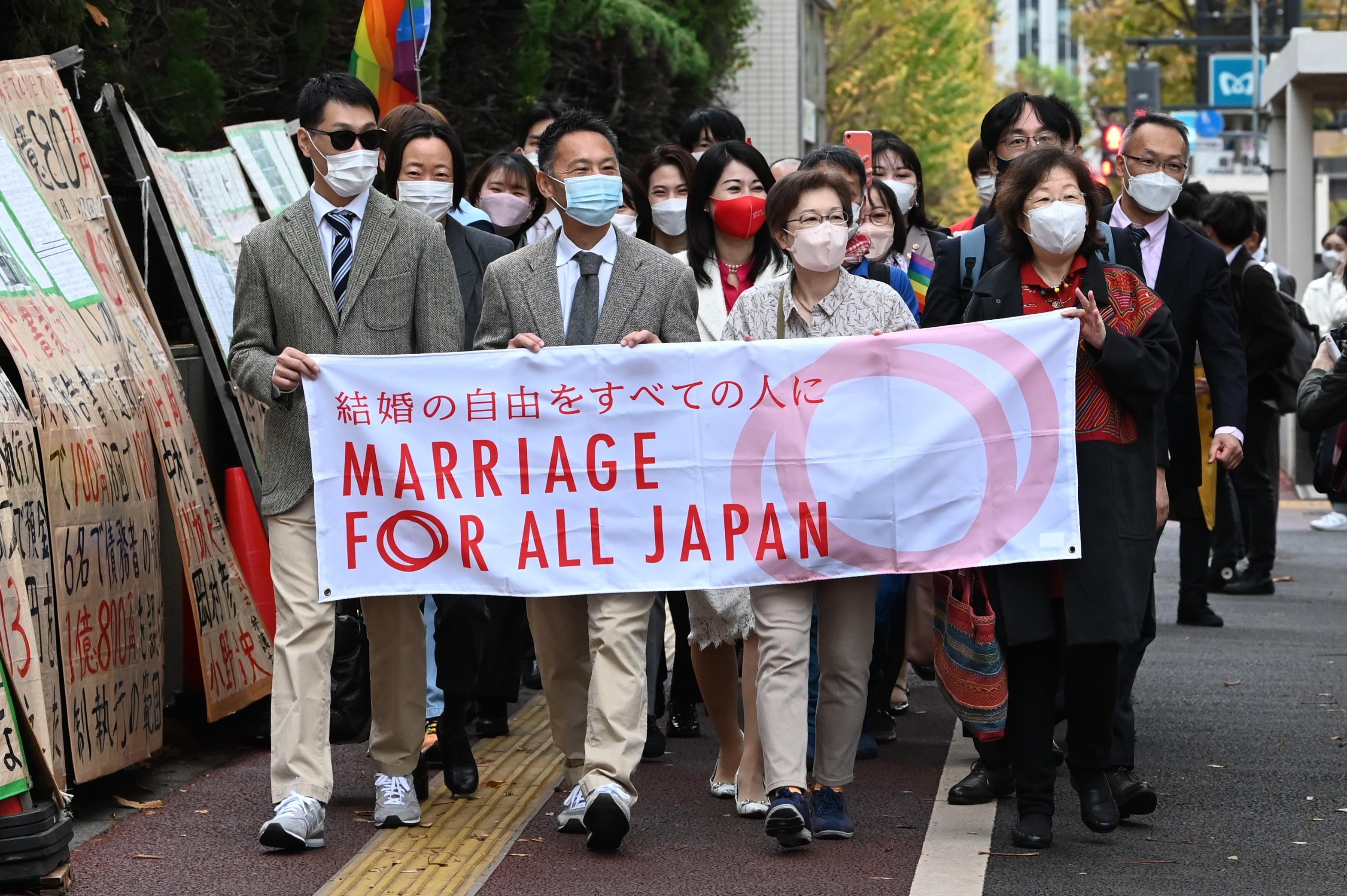 Plaintiffs and their supporters head to the Tokyo District Court in Tokyo on November 30, 2022, in a lawsuit filed by same-sex couples seeking damages from the government arguing the ban on same-sex marriage is unconstitutional. (PHOTO / AFP)
Plaintiffs and their supporters head to the Tokyo District Court in Tokyo on November 30, 2022, in a lawsuit filed by same-sex couples seeking damages from the government arguing the ban on same-sex marriage is unconstitutional. (PHOTO / AFP)
TOKYO - A Japanese court on Thursday said a ban on same-sex marriage was constitutional but it raised concerns about the dignity and human rights of same-sex couples, a ruling short of activists' expectations but still seen as a step forward.
The judgement by the Fukuoka district court came a week after another district court said it was unconstitutional to ban same-sex marriage, bolstering hopes for change among the LGBTQ community in Japan, the only Group of Seven nation without legal protection for same-sex unions.
Opinion polls show about 70 percent of the public supports same-sex marriage but the conservative ruling party of Prime Minister Fumio Kishida opposes it
Five rulings on same-sex marriage have been handed down in Japan over the past two years - two concluding the ban was unconstitutional, one saying it was not, and two, including Thursday's, upholding the ban but raising other rights concerns.
A Tokyo court last year upheld the ban but said a lack of legal protection for same-sex families violated their rights.
The Fukuoka court echoed that Tokyo judgement, saying that while not allowing same-sex marriage was within the constitution, it went against a clause saying marriage and family matters were based on individual dignity, terming it a "state of unconstitutionality".
ALSO READ: Japan court rules same-sex marriage ban constitutional
Masahiro, a plaintiff who gave only his first name, said he was encouraged by the overall trend in the court cases.
"Four of the five rulings so far have either found not allowing same-sex marriage is unconstitutional or is at odds with part of the constitution," he told a press conference.
"It does feel as if we took a step forward, so I'm relieved."
Opinion polls show about 70 percent of the public supports same-sex marriage but the conservative ruling party of Prime Minister Fumio Kishida opposes it.
Kishida in February sacked an aide after he sparked outrage by saying that people would flee Japan if same-sex marriage was allowed and that he did not want to live next to lesbian, gay, bisexual or transgender couples.
Kishida has remained noncommittal about the issue despite strong pressure from other G7 nations, especially the United States, in the run-up to Japan's hosting of the G7 leaders' summit last month.
"We would have liked for this ruling to have been a stronger message to parliament that the law needs to be changed," said another plaintiff, identified as just Kosuke.
'Misunderstandings'
Chief Cabinet Secretary Hirokazu Matsuno told a press conference it was necessary to pay close attention to public opinion at all levels when considering same-sex marriage.
More than 300 municipalities throughout Japan covering about 65 percent of the population allow same-sex couples to enter partnership agreements but their rights are limited
Business lobbies have called for change, arguing that without diversity including LGBTQ rights, the world's third-largest economy will not be globally competitive.
More than 300 municipalities throughout Japan covering about 65 percent of the population allow same-sex couples to enter partnership agreements but their rights are limited.
Partners cannot inherit each other's assets or have parental rights to each other's children, and hospital visits aren't guaranteed.
READ MORE: Japan court: Not allowing same-sex marriage 'unconstitutional'
Kishida's government promised to pass a law promoting "understanding" of LGBTQ people before the G7 summit, but opposition from conservatives delayed it so much that a watered-down version is likely to only come to a vote next week.
The initial draft stipulated that discrimination on the basis of sexual orientation and gender identity should "not be tolerated" but was changed to "there should be no unfair discrimination", wording critics say tacitly allows bigotry.
Wataru Ishizaka, an openly gay member of a Tokyo assembly, said he was relieved by the ruling but much remained to be done.
"These court cases have attracted public attention to LGBT issues, and understanding has progressed to a certain extent," he said. "But there are still misunderstandings."


